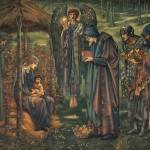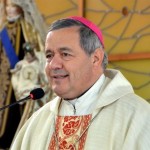It is good to give thanks to the Lord,
to make music to your name, O Most High,
to proclaim your love in the morning
and your truth in the watches of the night,
on the ten-stringed lyre and the lute,
with the murmuring sound of the harp.
(Psalm 92:2-4)
And, apparently, with the music of birds on wires, as well, at least in the eyes, and to the ears, of one clever musician in Brazil!
While reading a newspaper one day, a musician named Jarbas Agnelli saw a photo of birds sitting on an electrical wire. He cut it out and decided to create a song using the exact location of the birds on the wire as musical notes. This short video demonstrates his musical interpretation of the birds.
It reminds me of Pope Benedict’s appreciation of music:
…music’s third place of origin is in the encounter with the divine which, from the beginning, is a part of that which defines the human reality. It is this encounter of man with the totally other and the totally great that elicits even more so new ways of expression. As a matter of fact, perhaps it could be said that even in the other two areas – love and death – the divine mystery touches us and, in that sense, it is the fact of being touched by God that constitutes the origin of music, all told. I find it moving to observe how in the Psalms, for example, singing alone does not suffice: appeal is made to all instruments. In this way the hidden music of all creation – its mysterious language – is aroused. With the Psalter, in which the motifs of death and love are also operative, we find ourselves right at the origin of the sacred music of the Church of God. One can say that the quality of music depends upon the purity and the greatness of the encounter with the divine, with the experience of love and of pain. The purer and truer this experience is, the purer and greater also will be the music that is born and develops from it.
Amen? “All creation rightly gives you praise…” even if just as the notes on a staff!













